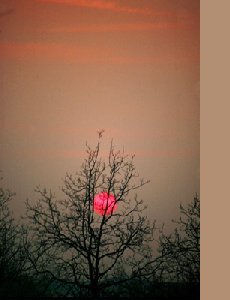
The Teachings of Chuang Tzu
Seeing Nature With New Eyes.
"Do the heaven's revolve? Does the earth stand still? Do the sun and the moon contend for their positions? Who has the time to keep them all moving? Is there some mechanical device that keeps them going automatically? Or do they merely continue to revolve, inevitably, of their own inertia?
"Do the clouds make rain? Or is it the rain that makes the clouds? What makes it descend so copiously? Who is it that has the leisure to devote himself, with such abandoned glee, to making these things happen?"
Where All Dualities Are Resolved Into Unity.
"The universe is the unity of all things. If one recognizes his identity with this unity, then the parts of his body mean no more to him than so much dirt, and death and life, end and beginning, disturb his tranquillity no more than the succession of day and night."
"The sage has the sun and the moon by his side. He grasps the universe under his arm. He blends everything into a harmonious whole, casts aside whatever is confused or obscured, and regards the humble as honorable. While the multitude toil, he seems to be stupid and non-discriminative. He blends the disparities of ten thousand years into one complete purity. All things are blended like this and mutually involve each other."
Tao has reality and evidence but no action or physical form.
It may be transmitted but cannot be received.
It may be obtained but cannot be seen.
It is based in itself, rooted in itself.
Before Heaven and Earth came into being,
Tao existed by itself for all time.
It gave spirits and rulers their spiritual powers.
It created Heaven and Earth.
It is above the zenith but is not high.
It is beneath the nadir but is not low.
It is prior to Heaven and Earth but is not old.
It is more ancient than the highest antiquity
but is not regarded as long ago.
Interchangibility of Appearance And Reality.
How can we be sure of what we are seeing?
Those who dream of the banquet may weep the next morning, and those who dream of weeping may go out to hunt after dawn. When we dream we do not know that we are dreaming. In our dreams we may even interpret our dreams. Only after we are awake do we know that we have dreamed. But there comes a great awakening, and then we know that life is a great dream. But the stupid think they are awake all the time and believe they know it distinctly.
Once I, Chuang Tzu, dreamed I was a butterfly and was happy as a butterfly. I was conscious that I was quite pleased with myself, but I did not know that I was Tzu. Suddenly I awoke, and there was I, visibly Tzu. I do not know whether it was Tzu dreaming that he was a butterfly or the butterfly dreaming that he was Tzu. Between Tzu and the butterfly there must be some distinction. [But one may be the other.] This is called the transformation of things.
The mind of the perfect man is like a mirror. It does not lean forward or backward in response to things. It responds to things but conceals nothing of its own. Therefore it is able to deal with things without injury to its reality.
Of Death.
The universe gives me my body so that I may be carried, my life so I may toil; my old age so I may repose, and my death so I may rest. To regard life as good is the way to regard death as good. A boat may be hidden in a creek or a mountain in a lake. These may be said to be safe. But at midnight a strong man may come and carry it away on his back. An ignorant person does not know that even when the hiding of things, large or small, is perfectly well done, still something will escape you. But if the universe is hidden in the universe itself, then there can be no escape from it. This is the great truth of things in general.
We possess our body by chance and we are already pleased with it. If our physical bodies went through ten thousand transformations without end, how incomparable would this joy be! Therefore the sage roams freely in the realm in which nothing can escape and all endures. Those who regard dying a premature death, getting old, and the beginning and the end of life as equally good are followed by others. How much more is that to which all things belong and on which the whole process of transformation depends that is, Tao?
Back to Taoist Masters
|

